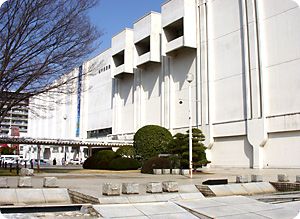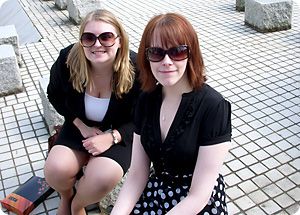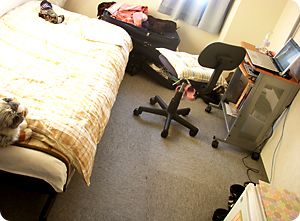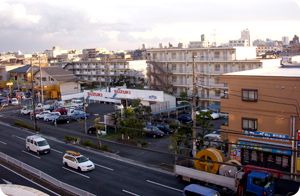
I’ve been debating writing about this topic for a while now, and I think it’s time to stop putting it off. Despite my overwhelming laziness when it comes to writing anything of actual substance and my hesitation to write about my previous employers (c’mon, it’s just plain bad etiquette), there’s a glaring lack of information about what to expect if you do decide to take the plunge. It’s an unfortunate truth that many people go with misconceptions about what the job will be like, so I’ll try to provide as much information about my own experiences as I can. I hope it helps!
{My background and motivations}
I worked as an Assistant Language Teacher (or ALT) in Japan from spring of 2009 to 2010. I guess it would be inappropriate for me to say what company I worked for, but I will say it has the same name as that organ that pumps blood throughout your body. Ahem.
As a Japanese language major and recent college graduate, teaching English in Japan seemed like a fairly logical next step. I wanted to actually be able to use my degree in some way, and that was almost certainly not going to happen if I stayed in Pennsylvania. I had precisely 0 teaching experience, and the only time I’d been around children for any length of time was when I was one. You’d think that this would have disqualified me from becoming a teacher at all, but that’s the great thing about becoming an ALT… If you have a B.A. and you speak English (non-native speakers, just fake it), you’re in!
{Getting hired}
Now, I can’t testify to the hiring processes of other English schools in Japan, since I obviously only worked for one. What I do know is that I applied at one or two that didn’t hire me, and I missed the deadline for applying to JET. Maybe JET, Interac, AEON, and all the others have a more stringent hiring process, but mine consisted of me filling out an application, having a 15 minute phone interview in which I don’t think the interviewer fully understood the questions they were asking me, and voila! Job offer! If only finding work in the States were so easy. For the record, the call quality was terrible during the interview and I thought I totally botched it, but everything worked out.
{Before you go…}
I knew going into it that my company had pretty terrible employee satisfaction rates, but I figured that most people only bother writing something about their job on the internet if they hated it. Sure, some of it might be true, but people do have a tendency to over-dramatize every perceived slight in the workplace. And even if I hated the job, the contract was only for a year, and I’d still get a chance to work in Japan and thus improve my Japanese. Mission accomplished, right? Well, sort of. While I’m sure I learned SOME stuff while I was over there, I fell into the same trap as many foreigners living overseas and used English waaaay more than I should have. But that was entirely my own fault.
So I gleaned what information I could from the internet and my company’s website, which asks all new ALTs to bring at least $3000USD with them for rent, security deposit, living expenses for when you first arrive, and all sorts of other incidentals. Surely, they had to be exaggerating, but I did manage to bring roughly that amount with me just in case. As it turns out, you can easily spend all of that and more when you first arrive, because there is a shit-ton (roughly 180 metric tons) of stuff you need to pay for and buy once you get there.
I won’t delve into the frustration that is packing up everything you might need in a year and trying to fit it into two suitcases, let’s just all agree that it is extremely difficult. And I’m not even one of those girls with 9000 pairs of shoes, I travel pretty lightly.
Again, (and I can’t stress this enough) I can’t speak for other companies, but in my case, I didn’t find out anything about where in Japan I was going to be working until practically right before I left. It was explained to me that this was more the fault of the local boards of education and excessive red-tape than anyone at my company, but it was still rather irritating. As a rule, I don’t like surprises, I like to know what to expect well in advance. Fortunately, as a result of either extremely good karma or divine intervention, I managed to get one of the most sought-after placements they had to offer. I managed to get placed in Urayasu, which is a suburb of Tokyo and one of the wealthiest areas in Japan! By sheer coincidence, this was also the very city I’d studied abroad in during fall of 2006, so I already was very familiar with the area and thrilled to be going back. I didn’t know what school I’d be teaching at by this point, but I didn’t especially care.
{Once you arrive…}
Before starting the job, there was a mandatory training… thing… up in Ibaraki prefecture. Not too far, but certainly not close. I arrived at Narita a day early, and spent the first night in a hotel near the airport. It had been reiterated numerous times that no one from the company was going to hold your hand and assist you, especially with issues not related to teaching. This wasn’t much of an issue for me, since I usually didn’t want or need their help. However, I have to admit that getting off of the plane and having to get to Mito on my own was rather stressful. I managed to haul my luggage (that weighed more than me) to my hotel just fine, but when I went to purchase my bus ticket to Mito the following day, the lady at the ticket counter said I couldn’t bring that much luggage on the bus. She vaguely suggested I use a delivery service to send one of the bags, but couldn’t tell me anything about how to do that.
So I wandered around Narita, panicking that I might miss the bus, and eventually I found the luggage delivery counter. They were much nicer and more helpful, and shipping one of my two suitcases was delightfully cheap. I highly recommend doing this, if you ever find yourself in a similar situation. I made it to the bus just in time, and arrived in Mito later that afternoon. They had sent all ALTs a map of the area, with extremely vague walking directions from the station to the hotel. Sending one of my suitcases was the best thing to have happened, because it was a HIKE from there to the hotel. I’m not sure I would have made it there in one piece had I been carrying both of them. Again, I made it to my next destination unscathed, and checked into the hotel (the company didn’t pay for the hotel, either, but it was extremely cheap, so it wasn’t that big of a deal).

Training was held here, in a dank basement of this ugly government building.
I say that this was training because that’s what they called it, but the several days spent there was an extremely tedious “orientation” at best, and a waste of money for a hotel room at worst. I did get to meet some other ALTs at this point, but I never saw most of them again once training concluded, as everyone was working in different cities throughout the Kanto region.

Me during lunch with Bridget, my former Penn State classmate and coincidental co-worker in Japan.
IIRC, we had two days of orientation, which mostly consisted of the company warning us of things we weren’t to do, like molesting kids. They gave us very little information regarding what to expect once we were actually thrown into the classroom, which probably would have been nice, but alas. I had originally been told that I’d be teaching at one junior high school, but this turned out to be flat-out wrong. They gave me new information during the first training session, saying I’d be teaching at an elementary school instead. Honest mistake, I thought. As it turns out, this information was wrong as well, and I finally found out the next day that I was to teach at two separate elementary schools. Third time’s a charm, I suppose. They were still in the same city, so that was fine, but there’s a big difference between teaching in elementary schools and teaching in junior high schools, so that would have been nice to know in advance. Anyway, we also received information about where we’d be living at this point.
{Housing}
It’s my understanding that the majority of ALTs were set up in cheap apartments like Leo-Palace, at least in the more rural areas. Once you get closer to Tokyo, apartments become a LOT more expensive. To avoid having to be the guarantor for its employees, my company set ALTs up in guesthouses whenever possible. On the plus side, guesthouses are cheaper than apartments, you pay monthly and can leave when you please as long as you give a month’s notice, and you typically don’t need a guarantor. As a foreigner, finding housing in Japan can be extremely difficult if you don’t have someone to co-sign for you. So if you’re living in Tokyo, a guesthouse can be a viable alternative, especially if you’re only staying for a few months to a year. The downside is that unlike an apartment, guesthouses usually have separate rooms, but shared facilities such as the kitchen, bathrooms, and laundry. It’s more like a college dormitory than anything. Since any apartments in my city would have been out of my price range and I wouldn’t have had a guarantor anyway, I went the route of the guesthouse.
At the conclusion of the training in Mito, ALTs were generally shown to where they’d be living by their area’s ALT coordinator. To be honest, I have no idea who my coordinator was, at this point. They originally told me it was some guy whose name eludes me now, but later I found out it was some completely different woman. Anyway, my city was a few hours by car from where the training was held, so they hired some car service to drop me off, and sent me on my way. Most. Awkward. Drive. EVER. It probably wouldn’t have been so annoying if the traffic wasn’t as terrible as it was. But I ended up spending the better part of a day riding shotgun with some middle-aged Japanese dude in bumper-to-bumper traffic. He didn’t speak any English, so save for occasional small-talk in Japanese, we spent a lot of the trip just sitting there in an uncomfortable silence. When we finally arrived in what was to be my new hometown of Minami-Gyoutoku, my chauffer wished me luck, and dropped me off at the doorstep of T&V Guesthouse.
My guesthouse was an unimpressive, generic-looking building that sat directly along a major road. There were 6 floors, 1-4 being co-ed and 5 and 6 exclusively for women. The kitchen, communal sitting area and lobby were all on the first floor, the laundry was on the third floor, and I lived on the 6th floor (Fortunately, there was an elevator, which only occasionally smelled like urine). The owner of the building, a kind of pervy but nice old dude, was there to show me to my room when I arrived. For some reason, I found him extremely difficult to understand, old Japanese guys really need to enunciate better. Later, the very creepy English-speaking landlord came by to explain the rules of the place and have me sign a contract, and he showed me how to get to the train station and to Maruetsu, a nearby supermarket. I also found out that I had to pay extra every month to rent the futon that was in my room, and I still had to buy a cover, sheets, and blanket for it.

My room, which I (for some reason) did not tidy up before photographing...
The room itself was miniscule. I once lived in a single dorm at Penn State, and this room was practically half the size of that. Fortunately, the size of my living space is not much of a concern to me at all. If it weren’t for all the sodomy, I’m sure I’d do very well if I were ever put in prison. My room was furnished with one awkwardly-shaped wardrobe for all of my clothing, a mini-fridge with a freezer section that was essentially useless, my rental futon, a sink/mirror combo, and a little desk thing that I could put my computer on. I managed to get through a year without buying much else in the way of furnishings, and even if I had, not much more would have fit in the room without greatly hindering my ability to walk around.
I took videos of the place when I got there, you can watch them HERE if you're really that curious.
One of the very first things I noticed was that if I opened the window (AC was expensive, the electricity wasn’t included in the rent), the wind would make the door to my room rattle. This drove me insane at first, as did all the noise from the street below my window. Equally unfortunate was the grime that would tend to build up, especially by the window, from all nonstop trucks/buses/cars going by. It wasn’t all bad, though, I had a pretty cool view since I was on the 6th floor. If you could ignore the big ugly bike store with its huge sign right across the street, it had a nice view of Tokyo in the distance, as well as the Ferris wheel in Kasai and the nightly fireworks at Tokyo Disneyland. So despite my initial disappointment with the place (living in Shin-Urayasu during my study abroad had really spoiled me), I came to really love Minami-Gyoutoku after a while.

Very crappy picture of the view from my room.
I hadn’t really intended to make this as long as I already have, but I guess I tend to ramble when I get nostalgic. Since this is already TL;DR, I’m going to split this topic up into 2 posts, and focus more on the actual teaching aspect of being an ALT in part two. Until then! =)

2 comments:
I love your blog!
Have a nice time!
Paula
Thank you!♪
(Btw, the recipes on your blog look great, even though I can't read Polish! n_n)
Post a Comment